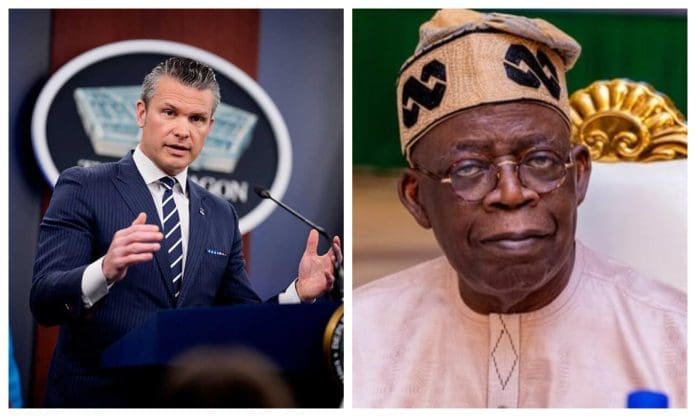United States Defense Secretary Pete Hegseth has confirmed that the Department of War is preparing for possible military action in Nigeria following President Donald Trump’s directive over alleged attacks on Christians. Hegseth made the announcement on Saturday via X in response to Trump’s earlier warning of potential military intervention.
“Yes sir. The killing of innocent Christians in Nigeria and anywhere must end immediately. The Department of War is preparing for action. Either the Nigerian Government protects Christians, or we will kill the Islamic terrorists who are committing these horrible atrocities,” Hegseth wrote. The statement directly echoed Trump’s Saturday night post threatening to withdraw all United States aid and deploy troops to Nigeria.
Trump had posted on Truth Social that if the Nigerian government continues to allow the killing of Christians, the USA will immediately stop all aid and assistance to Nigeria, and may very well go into that now disgraced country, guns blazing, to completely wipe out the Islamic terrorists who are committing these horrible atrocities. The president added that he was instructing the Department of War to prepare for possible action that would be fast, vicious, and sweet.
The defense department, which President Trump renamed the Department of War, is now officially preparing for action in Nigeria. The dramatic escalation came just one day after Trump redesignated Nigeria as a Country of Particular Concern (CPC) under the International Religious Freedom Act, citing what he described as ongoing violence against Christians and government failure to protect religious minorities.
Nigeria has long grappled with security challenges across multiple fronts. The northeastern region remains the epicenter of a Boko Haram jihadist insurgency that has killed more than 40,000 people and displaced over two million since 2009, according to United Nations figures. In central Nigeria, deadly clashes between majority Muslim herders and majority Christian farmers have claimed numerous lives over the years.
However, Nigerian officials have strongly rejected Trump’s characterization of the situation. President Bola Ahmed Tinubu stated that the designation does not reflect the national reality, nor does it take into consideration the consistent and sincere efforts of the government to safeguard freedom of religion and beliefs for all Nigerians. Tinubu emphasized that Nigeria remains a democracy anchored on constitutional guarantees of freedom of religion and belief.
The Nigerian Ministry of Foreign Affairs also pushed back against allegations of Christian genocide, stating that Nigeria is committed to tackling violent extremism fueled by special interests who have helped drive such decay and division in countries across the intersecting West African and Sahel regions. Tinubu’s press secretary, Bayo Onanuga, called the characterization a gross exaggeration of the Nigerian situation, noting that Christians, Muslims, churches and mosques are attacked randomly.
Security analysts have noted that while Christians are among those targeted by armed groups, the majority of victims are actually Muslims in Nigeria’s Muslim majority north, where most attacks occur. Nigeria’s population of approximately 220 million is split almost equally between Christians and Muslims, and the country’s constitution guarantees freedom of religion.
The Trump administration’s increasingly aggressive stance represents a significant shift in United States policy toward one of Africa’s most populous nations and a key American ally in regional counterterrorism efforts. Senator Ted Cruz and other Republican lawmakers have praised the president’s actions, with Cruz stating he has fought for years to counter what he described as the slaughter and persecution of Christians in Nigeria.
Nigeria was first placed on the Country of Particular Concern list in 2020 over what the State Department called systematic violations of religious freedom. The designation was lifted in 2023 in what observers saw as an effort to improve bilateral ties ahead of then Secretary of State Antony Blinken’s visit to Nigeria. The redesignation now marks a return to more confrontational diplomacy between Washington and Abuja.
Observers warn that the Trump administration’s rhetoric could heighten diplomatic tensions and complicate ongoing security cooperation between the two nations as they navigate complex issues of religious freedom, counterterrorism, and regional stability.
Source: newsghana.com.gh











